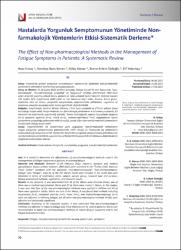Hastalarda Yorgunluk Semptomunun Yönetiminde Nonfarmakolojik Yöntemlerin Etkisi-Sistematik Derleme
Özet
Amaç: Hastalarda gelişen yorgunluk semptomunun yönetiminde kullanılan non-farmakolojik
yöntemlerin etkinliğinin belirlenmesi amaçlanmaktadır.
Gereç ve Yöntem: 21-28 Şubat 2022 tarihleri arasında, Türkiye Ulusal Tez Veri Tabanı’nda “nonfarmakolojik”, “non-farmakolojik, yorgunluk” ve “yorgunluk” anahtar kelimeleriyle 1992-2021
yılları arasında yapılmış yüksek lisans, doktora ve tıpta uzmanlık tezleri tarandı. Bulunan toplam
291 tezden 66’sı araştırmaya dahil edildi ve veri tabanına kayıt yılları, konusu, örnek grubu,
araştırma türü ve amacı, yorgunluk semptomunu değerlendirme yöntemleri, uygulama ve
araştırma sonuçları açısından tablo haline getirilerek değerlendirildi.
Bulgular: Araştırmada, tezlerin 38’inin doktora, 1’inin tıpta uzmanlık ve 27’sinin yüksek lisans
tezi olduğu tespit edildi. Araştırmalarda non-farmakolojik yöntemlerin 4 tanesinin çocuklarda, 62
tanesinin ise erişkinlerde uygulandığı görüldü. Tezlere bakıldığında sadece 4 çalışmada akupress
(n=1), gevşeme egzersizi (n=1), müzik (n=1), aromaterapi+masaj (n=1) uygulamasını içeren
yöntemlerin yorgunluğu gidermede etkili olmadığı, ancak diğer tüm non-farmakolojik yöntemlerin
(n=62) etkili olduğu tespit edildi.
Sonuç: Değerlendirilen 66 araştırmaya göre uygulanan non-farmakolojik yöntemlerin
oluşan yorgunluk semptomunun giderilmesinde etkili olduğu ve hastalarda bu yöntemlerin
kullanılabileceği sonucuna varıldı. Hemşireler tarafından yorgunluk semptomunun giderilmesinde
non-farmakolojik yöntemlerin uygulanması ve hemşirelerin yorgunluk semptomunu değerlendirme
ölçeklerini kullanmaları önerilir. Aim: It is aimed to determine the effectiveness of non-pharmacological methods used in the
management of fatigue symptoms in patients in relieving fatigue.
Material and Methods: Between 21-28 February 2022, master’s, doctoral and medical
specialization theses written between 1992-2021 were searched in the “Turkey CoHE National
Thesis Center” database with the keywords “non-pharmacological”, “non-pharmacological,
fatigue” and “fatigue”. Sixty-six of the 291 theses found were included in the study and were
tabulated in terms of registration years, subject, sample group, research type and purpose,
fatigue assessment methods, application, and research results.
Results: In the research, it was determined that 38 of the theses were doctoral theses, one of
them was a medical specialization thesis and 27 of them were master’s theses. In the studies,
it was seen that four of the non-pharmacological methods were applied in children and 62 of
them were applied in adults. When we look at the theses, it was found that methods including
acupressure (n=1), relaxation exercise (n=1), music (n=1), and aromatherapy+massage (n=1)
were not effective in relieving fatigue, but all other non-pharmacological methods (n=62) were
effective and statistically significant.
Conclusion: According to 66 evaluated studies, it was concluded that non-pharmacological
methods are effective in reducing fatigue and these methods can be used in patients. Nurses are
recommended to apply non-pharmacological methods to relieve fatigue symptoms and to use
fatigue assessment scales.
Cilt
9Sayı
1Bağlantı
https://hdl.handle.net/11363/5307Koleksiyonlar
Aşağıdaki lisans dosyası bu öğe ile ilişkilidir:


















